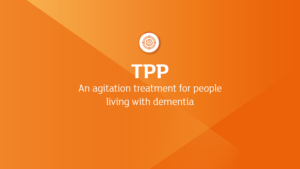A Target Product Profile for an agitation treatment for people living with dementia

18th January 2022
Overview
There is a huge unmet need for effective and safe treatments for the symptoms of dementia and Alzheimer’s disease to help patients and carers today and into the future. Investment in research in this area as well as the investment seen in development of disease-modifying treatments are much needed to ensure that anyone living with dementia has access to treatments that will improve their quality of life, throughout their life.
To help stimulate investment and interest in developing new treatments for people living with dementia, Medicines Discovery Catapult and Alzheimer’s Research UK have joined forces to develop a Target Product Profile (TPP) for agitation in Alzheimer’s disease. A TPP is a guide for drug developers and researchers that lists the criteria a new drug needs to have to effectively treat a condition; in this case, agitation in Alzheimer’s disease. It creates a blueprint for what a superior treatment looks like, such as reduced side effects or a greater improvement in the patient. Using this information, a drug developer can begin to investigate new compounds and assess existing compounds which meet the requirements.
Alongside the TPP, we have also developed an economic model to provide a business case for drug developers, incentivising their investment by showing the market potential that exists. The model estimates the impact agitation has on patients, carers, and the health and social care system by showing the numbers of people affected by agitation and how agitation affects the provision of care. The effect of a new treatment; the reduced requirement for the provision of care and the associated costs; have been applied to the model giving the value of a drug that treats agitation. By combining the value of the change in care costs and the total patient population, the market for an agitation treatment is clearly defined and can be used to justify investment in the field.
Background
Agitation and aggression are a group of symptoms usually understood as purposeless behaviour such as shouting, moving about or even violence without an obvious cause (Livingston G, 2014). Agitation and aggression are highlighted as the symptoms to address in this TPP for several reasons;
- High impact: Agitation has a large impact on people living with dementia and their carers and is often an issue that precipitates the move into assisted living facilities.
- Poor existing treatments: Currently, treatments for agitation in Alzheimer’s disease and dementia are not very effective, can only be used for a maximum of 12 weeks, and have a number of side effects.
- High patient population: agitation and aggression are common symptoms of dementia and Alzheimer’s disease affecting an estimated 35-50% of people living with dementia.
These factors demonstrate the high unmet need that exists for symptomatic treatments for people living with dementia and Alzheimer’s disease and importantly, demonstrates an opportunity to meet that unmet need.
Launching the TPP – event recordings
Professor Rob Howard & Dr Kathy Liu, UCL
Dr Graeme Wilkinson, Medicines Discovery Catapult
Professor Martin Knapp, Department of Health Policy, LSE


